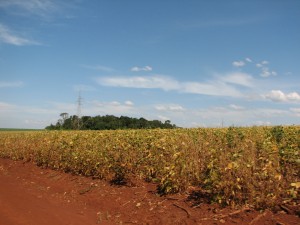The voices are growing louder. In recent weeks declarations released by social movements, as well as social justice and environmental NGO’s internationally have pronounced: there is no such thing as responsible soy. The very nature by which soy monoculture is produced, taking up vast swaths of land throughout South America, using massive amounts of water resources, depending upon chemical and synthetic fertilizers and pesticide inputs, and leaving a trail of contaminated and/or displaced communities in its wake, precludes it from ever being classified as responsible.

On Wednesday in Buenos Aires, the 3rd Annual meeting of the Roundtable on Responsible Soy (RTRS) will hold its opening session. Representatives from agribusiness (ADM, Bunge, and Cargill among others), the petroleum industry (Shell oil), finance (ABN Amro), and a few large NGO’s (WWF) will gather to discuss the prospects and possibilities of responsible soy. The representatives of this “multi-stakeholder” process will assemble for a couple of days without questioning whether the very nature of soy monoculture production is responsible—for the environment, for people, and for the climate. Instead, they will work to devise voluntary criteria aimed at encouraging better industry practices, without creating a system to outlaw the worst. And, the Roundtable has developed nothing concrete with respect to monitoring and oversight. For the companies at the Roundtable, there’s not a whole lot of incentive to improve much of anything–it’s only our planet, human rights, and our climate that’s at stake.
On the flipside, tonight in Buenos Aires at a cultural center in the heart of the city, I was part of an overflowing crowd that turned out for a public meeting and press conference to denounce the export soy model and the Roundtable on Responsible Soy. A panel of biologists, doctors, and intellectuals were joined by three campesinos from Paraguay who spoke about living on the frontlines of the soy frontier. They showed photos of children contaminated by agrotoxins, and once fertile land converted into a green desert. Pedro Pablo Caballero, from a community in San Pedro, Paraguay said passionately, “Now is the moment to defend our land and food sovereignty. We have very little time left.”
When the Roundtable ends promptly on Thursday evening, wouldn’t it be incredible if those in attendance could honestly say that they participated with the same urgency and resolve to stop the destruction that Pedro expressed tonight?